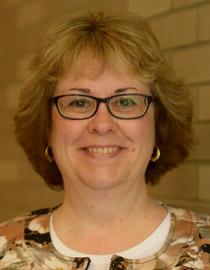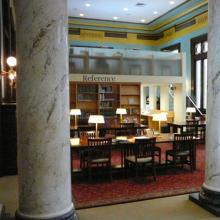Julia Chance Gustafson has been at the forefront of major changes in librarianship since arriving at the College of Wooster on Feb. 1, 1982.
Currently a research and outreach librarian, Julia started her career as a reference librarian, with responsibilities for coordinating the College of Wooster’s library instruction program. Since then, Julia worked as an electronic services librarian and access services librarian.
OhioLINK recently talked with Julia about her profession and the evolution of library services for higher education.
What changes have you seen over the past three decades?
What changes have I NOT seen? When I came to the College of Wooster, everything we did was print based. When students referred to "those green books," I knew they were usually referring to The Readers' Guide to Periodical Literature, the frequently used print periodical index in libraries.
Library search processes have moved from print to CD-ROMS to networked CD-ROMS to the Internet – and the ways to use the Internet have progressed from Gopher (a type of search protocol), to the World Wide Web, to Web 2.0 (interactive web sites), to social media, such as Facebook, Twitter and Pinterest, and to whatever incoming first year students bring to the table each year.

, Research & Outreach Librarian
, The College of Wooster Libraries, Wooster, Ohio
How do you collaborate with other Ohio liberal arts colleges?
The College of Wooster, Denison University, Kenyon College, and Ohio Wesleyan University merged their online library systems to form the CONSORT library system. I’ve also served as a site coordinator for two Five Colleges of Ohio (the above institutions, plus Oberlin College) information literacy grants.
Where does OhioLINK come in?
CONSORT joined OhioLINK to expand their own access to statewide resources and to make the collections of its member libraries readily available. OhioLINK is a huge draw for faculty and students at Wooster. The College of Wooster requires seniors to complete an Independent Study, which culminates in a major research paper, art exhibit, performance, etc. At one time, students were required to choose research topics that could be supported locally. With OhioLINK resources, ILLiad interlibrary loan, plus the collections the College of Wooster buys separately, student research topic options have become almost unlimited, creating unique research support opportunities for our librarians at The College.
How do you interact with students?
Librarians used to do mediated searches with students by their side. Now, librarians are teaching students best practices for searching databases and capturing the power of search engines. Also, instead of staffing a research help desk and answering general questions, a job my colleague has trained students to do, our librarians meet one-on-one with students to help them with their research projects.
Tell me about your outreach efforts.
I’ve been writing grants for public programing. Last year, I was awarded a grant from the National Endowment for the Humanities and the Gilder Lehrman Institute of American History to look at civil rights issues. It wasn’t just for faculty, staff and students; it was also for the community. By hosting a film/discussion series, we were able to get people talking about tough issues, thus enabling rich discussions between the campus and local communities.
Similarly, this past academic year, I was part of the annual “Hales Group,” a faculty study group supported by a local fund with the intention of increasing the integration of global studies elements into the curriculum. This group meets monthly to discuss common readings in preparation for travel to the chosen country or region for the year. Spring semester, people from the group apply to travel to the chosen country, and I was fortunate enough to be selected this year. We spent eight days traveling through Japan in May. I absorbed as much as I could through our activities, participated in the group’s blog (http://japan.scotblogs.wooster.edu/) writing about the schools we visited, snapped over 1,500 photos, and came away with a greater appreciation of Japanese culture. This fall, I oversaw two book displays (the first on the Holocaust and Japanese women; the second on Japanese religions, temples, and gardens) and have organized a photo exhibition of my own photographs in our library called: "Japanese Temples, Shrines, and Gardens: Reflections from the Hales Group Japan Trip May 2014” (http://www.wooster.edu/news/releases/2014/november/exhibition-gustafson/index.php). These projects were made possible with a lot of help from my student assistant, Sarah Williams.
In a different vein, I have been coordinating an ongoing drop-in workshop series that we have branded as “#ResearchProTips.” We offer everything from Zotero training, to Google Scholar, finding and using images, formatting papers in Word for Independent Study, creating beautiful charts and graphs, and whatever we think would be the hottest topic that would draw our students and faculty.
Our cultural programming and workshop series, as well as changes in the educational environment, have created the need for more marketing of what we do. So, I have been spearheading an effort to be more intentional about our library marketing efforts as well. It’s been an education, to say the least.
What do you like most about this profession?
This is a helping profession. I enjoy not only the hunt for information, but watching the light bulbs go off as students figure out what they can do and find what they need. It’s all about connecting people to the information in a way that makes sense.
I also enjoy professional networking and the challenges of keeping up with the ever-changing environment in which we work, so I have a strong commitment to professional development activities. This year I have been chair of the ALAO (Academic Library Association of Ohio) Professional Development Committee, and we are piloting a mentoring program for ALAO members. We are encouraged by the number of our peers signing up to either be a mentee or a mentor, so time will tell if this program will end up being successful. Many OhioLINK members are served by ALAO as many individuals in OhioLINK are members of both, so this work benefits OhioLINK as much as ALAO.
Editor’s note: This column showcases the extraordinary talent and leadership of the librarians and staff at OhioLINK’s member institutions. If you have suggestions for a library staff member who should be featured in this series, please email Meghan Frazer at mfrazer@ohiolink.edu.


